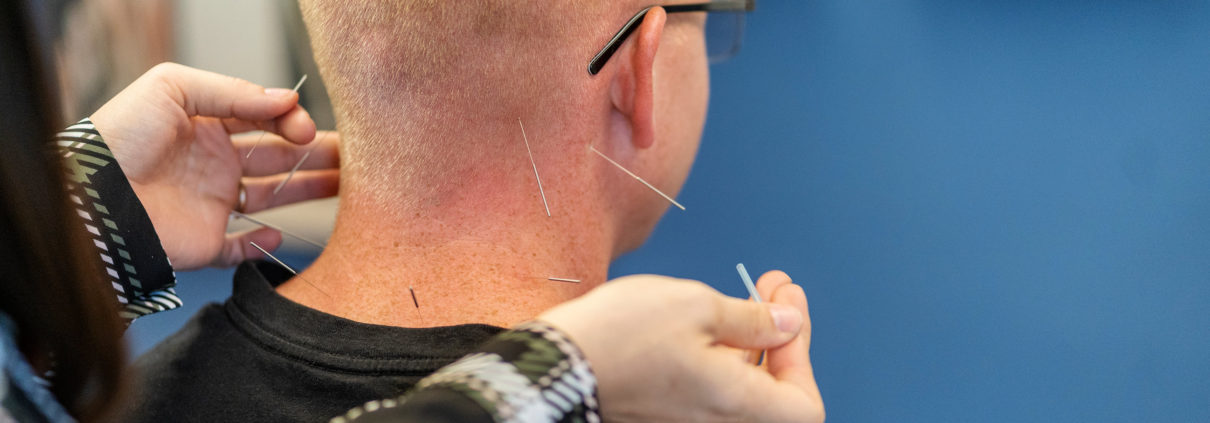5 benefits of Acupuncture
Acupuncture has been around for thousands of years as a treatment option for a wide variety of conditions. During the treatment, very thin sterile needles are gently inserted into specific points into the skin based on the patient’s goals and presentation. According to Traditional Chinese Medicine (TCM), acupuncture works by balancing the patient’s energy between the yin and yang of the life force known as QI (pronounced Chi). Qi is said to flow through meridians, which is accessible through specific points in the body. Although acupuncture has an extensive history of utilization, research of acupuncture use in Western medicine is largely limited to pain conditions such as back and neck pain, joint pain from arthritis, and headaches. Here are five conditions that acupuncture can be beneficial for.
Tension-type headaches are the most common type of primary headache, characterized by episodes of pain that is typically bilateral. Those that suffer from tension-type headaches typically describe their symptoms as pressing or tightness around their head, sometimes associated with sensitivity to light and sound. A Cochrane study in 2017 reviewed the effectiveness of acupuncture as a treatment option for tension-type headaches, and concluded ‘…acupuncture is effective for treating frequent episodic or chronic tension-type headaches…’¹ They also concluded that the combination of specific exercise and massage therapy, acupuncture was a viable complimentary treatment for tension-type headaches.
Migraine headaches are characterized by severe headaches, usually on one side that can last from a few hours to several days. Those suffering from migraine headaches described their symptoms as pulsating pain on one side, reduced ability to participate in their daily routine, nausea, and light and sound sensitivity. Most people respond to conservative care; however, some require medications as a preventative treatment option. According to a Cochrane review in 2016, researchers concluded that ‘…a course of acupuncture consisting of at least six treatment sessions can be a valuable option for people with migraine…’ Reporting that those receiving acupuncture had less frequent episodes of migraine and reported adverse effects less often when compared to pharmacological interventions.²
It is estimated that over 70% of adults suffer from back pain. Often times back pain leads to functional limitations and disability, which creates a significant economic burden on individuals and society, in the US low back pain, costs an estimated $100 billion every single year. A Cochrane review of acupuncture treatment for low back pain concluded that acupuncture was effective in functional improvements, and as an adjunct to care such as chiropractic, physical therapy, and exercise.³
Fibromyalgia is a musculoskeletal condition in which an individual will experience widespread chronic pain in multiple sites all over their body. Those suffering from fibromyalgia may also experience joint stiffness, chronic fatigue, sleep disturbances, and mood disorders. Conventional treatment for fibromyalgia could include cognitive therapy, physical therapy, and medications. According to a Cochrane review in 2013, researchers concluded that acupuncture can be utilized in treating fibromyalgia by reducing pain intensity and joint stiffness. The review found that those who received acupuncture reported consistent improved pain and function.4
Insomnia is a common condition caused by many factors, in which a person has difficulty getting to sleep, staying asleep, or even experience non-restorative sleep. This sleep difficulty leads to significant functional limitations during daytime that can effect work and activities of daily living. It is believed that the reason for these disturbed sleep patterns is due to overactive central and autonomic nervous system. A review of studies regarding the effect of acupuncture on sleep concluded that auricular (ear) acupuncture showed promising positive effects on primary insomnia5, although further research is needed to for a more definite conclusion.
Acupuncture is a very effective treatment option for many conditions, and has been shown to have very few adverse reactions. If you have any questions about acupuncture call our office to schedule a complimentary consultation!
- Linde, K., Allais, G., Brinkhaus, B., Fei, Y., Mehring, M., Shin, B., . . . White, A. R. (2016). Acupuncture for the prevention of tension-type headache. Cochrane Database of Systematic Reviews. doi:10.1002/14651858.cd007587.pub2
- Liu, L., Skinner, M., Mcdonough, S., Mabire, L., & Baxter, G. D. (2015). Acupuncture for Low Back Pain: An Overview of Systematic Reviews. Evidence-Based Complementary and Alternative Medicine, 2015, 1-18. doi:10.1155/2015/328196
- Deare, J. C., Zheng, Z., Xue, C. C., Liu, J. P., Shang, J., Scott, S. W., & Littlejohn, G. (2013). Acupuncture for treating fibromyalgia. Cochrane Database of Systematic Reviews. doi:10.1002/14651858.cd007070.pub2
- Lan, Y., Wu, X., Tan, H., Wu, N., Xing, J., Wu, F., . . . Liang, F. (2015). Auricular acupuncture with seed or pellet attachments for primary insomnia: A systematic review and meta-analysis. BMC Complementary and Alternative Medicine, 15(1). doi:10.1186/s12906-015-0606-7





Leave a Reply
Want to join the discussion?Feel free to contribute!